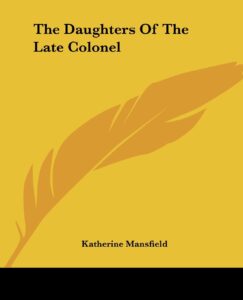I wouldn’t normally write about a single short story here but this one is such a gem I think it deserves a space all of its own. Actually it’s a miniature masterpiece structured like a tiny novel in twelve mini-chapters. So that’s my excuse – if I need one.
Written in 1920, The Daughters of the Late Colonel was published in 1921 by John Murry to whom Mansfield was married. She was from New Zealand but settled in England in 1918. She and Murry were close friends of DH Lawrence and his wife Freda – all four of them convention breakers. Aged 34, she died of tuberculosis in 1923 as Lawrence would seven years later. It was a hideously common disease.
The titular daughters are Constantia and Josephine whose domineering father has just died. They are virgins in their fifties – their younger brother is old enough to have an adult son. Their mother has been dead for 35 years. But they have no emotional maturity so they still share a room, giggle like nervous teenagers and struggle with everyday tasks and decisions. They are, moreover, limited by genteel poverty. It’s beautifully imagined and observed – and extraordinarily poignant.

These women were terrified of their father, who has dominated their lives, and Mansfield drips in flashbacks to show how awful it was as the reader is allowed to look “past” them objectively. Now they are frightened even to “trespass” in his bedroom even though he’s dead. He’s been the dominant presence in their arid lives for so long that they can’t switch him off.
They are frightened of the nurse who looked after the old man and allow her to take advantage of them. They’d like to sack the insolent maid Kate, who sees them as “old tabbies” but they haven’t the courage. They have never met their sister-in-law who lives with their brother in Ceylon but get occasional duty visits from their nephew, Cyril and these are painful, tortured occasions.
I think of The Daughters of the Late Colonel a lot when I struggle to communicate with deaf friends. It is true that once you have, perforce, repeated a piece of everyday, conversational trivia three times it begins to sound ridiculous so you give up usually to the fury of the person you’re trying to talk to. Then I remember Katharine Mansfield, Cyril and the meringues.
I know this story well because it features in many school anthologies and I used to teach it. Coming back to it now I marvel at the tension of sentences like this: “They only gave the blind a touch, but it flew up and the cord flew after rolling round the blindstick, and the little tassel tapped as if trying to get free.” Of course, Mansfield, despite her early death, was a prolific story teller and since I first read this one – still my favourite – I have read most of the others in various collections and more recently in Katharine Mansfield: The Collected Stories with introduction by Ali Smith (Penguin Classics,2007) which is a fat 700-page volume They’re all worth reading although some are stronger than others. And I don’t think she ever bettered The Daughters of the Late Colonel.

Next week on Susan’s Bookshelves: Whichever title of the six on the 2023 Booker Prize shortlist I have, by then, decided I like best!